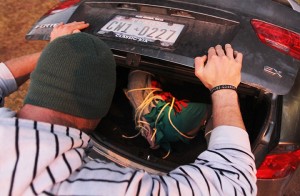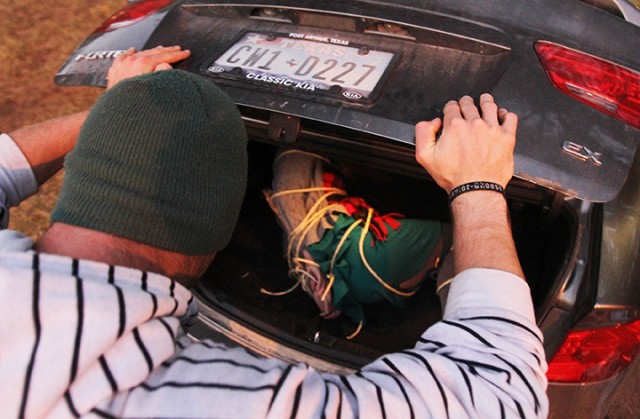
Matt Hellmen | Lariat Photographer
By Holly Renner
Reporter
Don’t be fooled by the Baylor Bubble.
A woman in Waco can disappear in moments and become a victim of sex trafficking, an umbrella term that covers the recruitment or transportation of people for the purpose of subjecting them to involuntary service in the sex industry.
The U.S. Department of Justice estimates that between 14,500 and 17,500 people are trafficked into the country each year.
The Federal Bureau of Investigation reported in an online bulletin published in 2011 that some young people are recruited into prostitution through forced abduction, pressure from parents or through deceptive agreements between parents and traffickers.
According to the bulletin, the lifestyle of victims revolves around violence, forced drug use and constant threats.
It can take place in any state or city — including Texas. In 2011, the National Human Trafficking Resource Center’s hotline received 19,427 phone calls – almost double the calls from 2010. Next to California, Texas was the second state with the most incoming calls.
Children at Risk, a nonprofit organization created to help children through research and education, said in the research article “The State of Human Trafficking in Texas” that Texas is a big hub for international human trafficking because of its busy interstate highways, international airports, bus stations, shipping commerce through the Gulf of Mexico and its shared border with Mexico.
According to Children at Risk, the Texas-Mexico border is North America’s number one supply site for young children subjected to sex trafficking.
The Federal Bureau of Investigation reported in an online bulletin published in 2011 that some young people are recruited into prostitution through forced abduction, pressure from parents or through deceptive agreements between parents and traffickers.
According to the bulletin, the lifestyle of victims revolves around violence, forced drug use and constant threats.
Unbound, Antioch Community Church’s nationally-growing, anti-human trafficking organization that began in March in Waco, works to end sex trafficking through education, rescue and aftercare, public policy and prayer.
Currently, there are eight Unbound chapters in the United States: Waco, Bell County, College Station, Dallas, Seattle and three in Boston.
Susan Peters, the national director for Unbound and a Waco resident, said young girls are being sexually advertised every day in Waco, and Houston is the number one area for sex trafficking. Peters said one of the most important ways to bring an end to trafficking is through education.
“We’ve done several education and awareness training for the church and for the community at large because awareness saves lives,” Peters said.
Unbound teaches people to never approach a victim or a pimp, but to let police know what is happening so something can be done, Peters said. The training is done for all chapters.
In addition to Unbound’s educational training, the organization offers specific trainings for police departments, social workers and other areas in the Waco community — those working directly with victims.
“We are committed to quarterly training and to facilitate specific training for professionals on the front line,” Peters said.
Peters said Unbound is in the process of developing curriculum for girls in juvenile centers and schools to educate them so they will be equipped to resist coercion or be able to get out of an abusive relationship if one has formed.
In addition, Peters said the organization is collaborating with members to create small support groups within poor areas where traffickers may look. Peters said they plan to have this finalized in January.
Peters said since March, Unbound in Waco has rescued two victims — both over 18-years-old — from sex trafficking. One of the girls, whose name could not be released, was a student who graduated from a local Waco high school and went to college, Peters said.
She was seduced by her boyfriend and dropped out of school, left her job and isolated herself from her family. She was trafficked all over the United States.
Peters said the rescued girl went to her mother’s home and is still in the recovery process, but her recovery may be a long process because of the emotional suffering caused from her experiences. The second victim lived in Iowa. Peters said the victim’s friend attended a Waco mission conference at Antioch with a seminar on sex trafficking.
Upon returning home to Iowa, the friend let a mentor know she was concerned the girl was a victim of sex trafficking, and they contacted the girl’s mother. Peters said Unbound intervened with the help of lawyers, the Federal Bureau of Investigation and volunteers who conducted research.
Through thorough investigation, they found the girl had been trafficked for two weeks. The girl is currently receiving treatment and therapy in a safe house.
Liz Griffin, Unbound’s director for strategic growth, said on an average night, Waco has 20 to 40 minors trafficked through online sources.
“They’re forced to post their own ads so it looks more like prostitution,” Griffin said. “If it’s self-posted, under the control and supervision of the trafficker, it’s kept secret.”
Griffin said Unbound has research teams that gather weekly to scan through Internet ads and are trained to identify girls because many of them are made to look much older than 15 years old.
Griffin said they are working to develop software to gather more data and cover more cities in order to take a large chunk out of Internet trafficking.
Most pornographic materials have a minor in them, which is considered sex trafficking, Griffin said. Since there is such a high demand for sex and a low supply, trafficking is rampant, she added.
Griffin said lowering the amount of sex trafficking victims could be done through education and awareness in the United States.
“We think it’s a child chained to a bed in a brothel. Many times you pass a victim of trafficking at a mall,” Griffin said. “There are also students who attend school who are being trafficked. It’s hidden in plain sight. The lack of understanding of what it looks like in a western culture is huge.”



